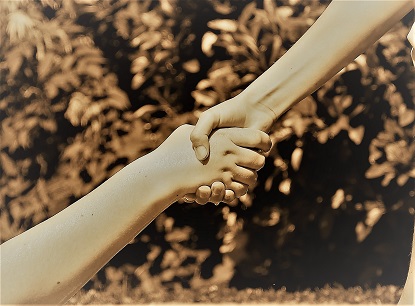Presented with the chance to help others who may be facing challenges similar to his own, James Griffiths jumped at the opportunity.
The 36 year-old is blind as a result of diabetes and complications from subsequent eye surgeries and has been a part of Vision Australia’s Peer Support Program for a number of years.
The Peer Support Program matches volunteers such as James with other individuals who are blind or have low vision. The volunteers offer their peers somebody to talk to about strategies and helpful tips for living with blindness or low vision and can provide support based on their shared experiences.
“When my vision started to go it definitely took me a while to come to terms with it. I went through periods where I was frustrated, sad, angry at myself and all those stages that come with a period of grief,” James said.
“One of the things that really helped me was a few good chats with my mates. They basically told me that I was going blind and I had to deal with it. That helped me come to grips with a few things and I decided to get some support which is how I ended up at Vision Australia.”
Along with the physical challenges that came with being blind, James said one of the biggest challenges he faced was what losing his vision meant for his ability to participate in the cultural aspects of his Aboriginal heritage.
“That was something that was really tough. A lot of Aboriginal culture is about being out in the environment and looking at things, be it a plant or an animal or whatever else,” he said.
“It was hard to deal with not being able to point key things out to my son or other young people and pass on our history and culture. If I go home to where I grew up there are different elements that mean different things and the fact that I can no longer see them was something I had to learn to cope with.”
James became a Vision Australia client in 2005 and has since made the most of what the not-for-profit offers, including support from Occupational Therapists, Orientation & Mobility and Adaptive Technology Specialists.
In 2008 James underwent a double organ transplant, receiving a new pancreas and kidney. A combination of that experience and his own passion for helping others drove him to join the Peer Support Program.
“The way I look at it, I’ve been given this amazing gift. The transplant is like a second life and I just felt like after that I should be doing something to try and help other people that might be going through the same sorts of things I did,” he said.
“I’ve always hated seeing people thinking they’re useless when really there capable of doing whatever they want. Being blind obviously has some challenges, but it doesn’t mean you can’t do what you want in life and I just wanted to do whatever I could to help people realise that.”

As a volunteer, James speaks with his peer over the phone as little or as often as they like. While he might share advice about how he has overcome challenges on his own or how support like that from Vision Australia has helped him, James said just offering others somebody who they can talk to who can relate to their experience is very important.
“With the right tools we can cope with pretty much anything, but sometimes we just need somebody to talk to so you know you’re not alone in going through something. Going through something like losing your vision can sometimes feel like there’s just a huge void and you’re alone in it.
“Just by being on the end of the phone I can give someone a person they can talk to who isn’t going to judge them. It’s going to be challenging, but I help let them know it isn’t the end of the world and I might even be able to pass on some advice that might help them with something.”
For more information on the Volunteer Peer Support program, click here.










